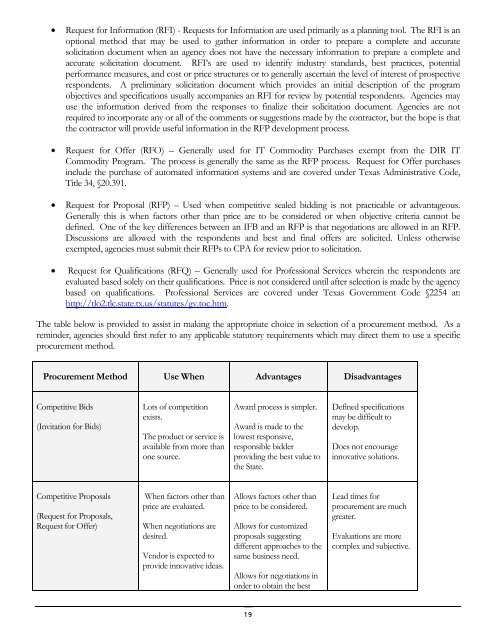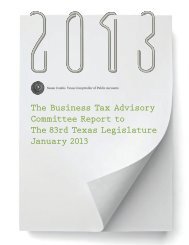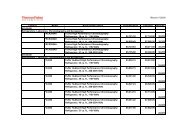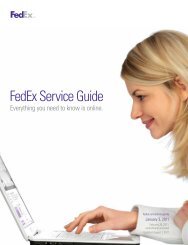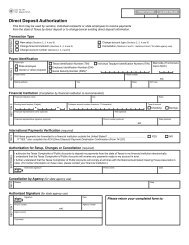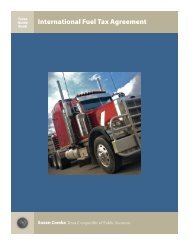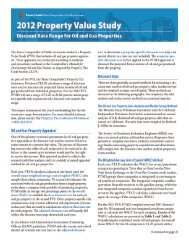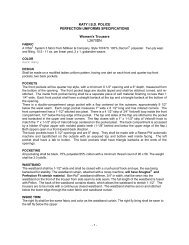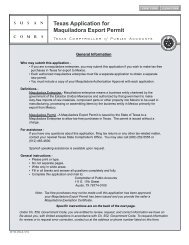Contracts Management Guide - Texas Comptroller of Public Accounts
Contracts Management Guide - Texas Comptroller of Public Accounts
Contracts Management Guide - Texas Comptroller of Public Accounts
Create successful ePaper yourself
Turn your PDF publications into a flip-book with our unique Google optimized e-Paper software.
• Request for Information (RFI) - Requests for Information are used primarily as a planning tool. The RFI is an<br />
optional method that may be used to gather information in order to prepare a complete and accurate<br />
solicitation document when an agency does not have the necessary information to prepare a complete and<br />
accurate solicitation document. RFI’s are used to identify industry standards, best practices, potential<br />
performance measures, and cost or price structures or to generally ascertain the level <strong>of</strong> interest <strong>of</strong> prospective<br />
respondents. A preliminary solicitation document which provides an initial description <strong>of</strong> the program<br />
objectives and specifications usually accompanies an RFI for review by potential respondents. Agencies may<br />
use the information derived from the responses to finalize their solicitation document. Agencies are not<br />
required to incorporate any or all <strong>of</strong> the comments or suggestions made by the contractor, but the hope is that<br />
the contractor will provide useful information in the RFP development process.<br />
• Request for Offer (RFO) – Generally used for IT Commodity Purchases exempt from the DIR IT<br />
Commodity Program. The process is generally the same as the RFP process. Request for Offer purchases<br />
include the purchase <strong>of</strong> automated information systems and are covered under <strong>Texas</strong> Administrative Code,<br />
Title 34, §20.391.<br />
• Request for Proposal (RFP) – Used when competitive sealed bidding is not practicable or advantageous.<br />
Generally this is when factors other than price are to be considered or when objective criteria cannot be<br />
defined. One <strong>of</strong> the key differences between an IFB and an RFP is that negotiations are allowed in an RFP.<br />
Discussions are allowed with the respondents and best and final <strong>of</strong>fers are solicited. Unless otherwise<br />
exempted, agencies must submit their RFPs to CPA for review prior to solicitation.<br />
• Request for Qualifications (RFQ) – Generally used for Pr<strong>of</strong>essional Services wherein the respondents are<br />
evaluated based solely on their qualifications. Price is not considered until after selection is made by the agency<br />
based on qualifications. Pr<strong>of</strong>essional Services are covered under <strong>Texas</strong> Government Code §2254 at:<br />
http://tlo2.tlc.state.tx.us/statutes/gv.toc.htm.<br />
The table below is provided to assist in making the appropriate choice in selection <strong>of</strong> a procurement method. As a<br />
reminder, agencies should first refer to any applicable statutory requirements which may direct them to use a specific<br />
procurement method.<br />
Procurement Method Use When Advantages Disadvantages<br />
Competitive Bids<br />
(Invitation for Bids)<br />
Competitive Proposals<br />
(Request for Proposals,<br />
Request for Offer)<br />
Lots <strong>of</strong> competition<br />
exists.<br />
The product or service is<br />
available from more than<br />
one source.<br />
When factors other than<br />
price are evaluated.<br />
When negotiations are<br />
desired.<br />
Vendor is expected to<br />
provide innovative ideas.<br />
Award process is simpler.<br />
Award is made to the<br />
lowest responsive,<br />
responsible bidder<br />
providing the best value to<br />
the State.<br />
Allows factors other than<br />
price to be considered.<br />
Allows for customized<br />
proposals suggesting<br />
different approaches to the<br />
same business need.<br />
Allows for negotiations in<br />
order to obtain the best<br />
19<br />
Defined specifications<br />
may be difficult to<br />
develop.<br />
Does not encourage<br />
innovative solutions.<br />
Lead times for<br />
procurement are much<br />
greater.<br />
Evaluations are more<br />
complex and subjective.


